1.0 Human intelligence seems to have required an extraordinary set of coincidences
If life requires strict reject limits, customizing a specific animal would appear to require even tighter specifications. Not only
must Mother Nature mix a cocktail with the right chemicals under the right environmental conditions to manufacture the
primordial cell, but she must in addition have a lengthy process consisting of carefully crafted relations with the right type
of plants and animals. It takes a more complex process to manufacture Man than it does to create a simple cell. Kingsolver
and Gomulkiewicz express the common wisdom prevalent in scientific circles when they explain that the environment
determines the range of morphological variation. [1] If intelligence is a function of environment, any change that we make
to this specification has the potential for upsetting our prediction. Indeed, Mayr remarks that only one species out of millions
developed human-level intelligence. This rarity, he suggests, shows that Man is an extraordinary coincidence:
- “ High intelligence has originated only once, in human beings. I can think of only two
possible reasons for this rarity. One is that high intelligence is not at all favored by
natural selection… all the other kinds of living organisms, millions of species, get
along fine without high intelligence...The other possible reason for the rarity of
intelligence is that it is extraordinarily difficult to acquire.” [2]
- In Mayr’s opinion, if Mother Nature had to do it all over again, she would most likely fail to give birth to Man. Anything could
go wrong during the long pregnancy. Any slight deviation in environmental conditions or in the history of interrelations with
other plants or animals and the elephant would not have developed its trunk or the kangaroo its pouch.
Mayr's argument is not new. It is a holdover from traditional religion which maintains that Man has a special place in nature.
God made us in His image and made us only once.
2.0 The experts confuse the organ with its function
I sympathize with this seemingly persuasive argument, but it fails to convince me. I am not persuaded because it glosses
over the distinction between intelligence and brain. Mayr seems to confuse the function with the organ. If an animal intends
to interact with the environment, it must necessarily develop organs to perform physical functions. The elephant developed
a trunk to grab things whereas a monkey may use its tail and the dog its mouth, but grabbing is universal. The brain is an
organ whereas 'intelligence' is more like 'grip': a skill, a function, or maybe a category. When we ponder whether intelligent
life exists somewhere else in the Universe we take for granted that the alien has a brain and continue to theorize about the
function.
3.0 One king necessarily develops per function
In fact, just to get the hang of where I'm headed with this argument, why don't we begin with a ‘lesser’ skill. Intelligence is
such a sensitive topic – especially with religious folk – that it tends to distract people from the issue at hand.
Let’s look at might. No one can deny that every animal has a body. And no one can deny that every region in every
geological epoch had its top predator. Who would we propose for the heavyweight champion of all time? Who was the
top predator of them all?
I think that there would be no argument here either. I believe we would all agree that no one would last one round against
the largest theropods, the T-Rex-like dinosaurs that appeared on and off again from the Jurassic to the late Cretaceous
(Fig. 1). You would think that there should be no reason preventing Mother Nature from having made cats (e.g., lions,
tigers, smilodons) as big as T-Rex while preserving other favorable attributes. However, this seems to go against the grain.
Surely the towering tyrannosaurids surrender dexterity and cunning to animals such as panthers and foxes, but so must
a heavyweight give up speed to a flyweight. A T-Rex doesn’t need to move fast or be sophisticated because he makes up
for these deficiencies with sheer size.
- ________________________________________________________________________________________
- Last modified 05/22/08
- Copyright © by Nila Gaede 2008
| All living entities developed Intelligence |
In other words, by focusing on intelligence skeptics like Mayr seem to overlook the fact that all animals developed heads.
If we direct our attention to the 'object' brain rather than to the 'function' intelligence, the task of determining whether
intelligence was unavoidable simplifies enormously. Now it is an objective issue dependent on definitions. Now we can
carry out an 'intelligent' discussion.
4.0 Every living entity developed a 'brain' and 'thinks'
Every plant and animal must have a manner of feeding itself. And every plant and animal must have a way of moving and
of reproducing, and of sleeping. We can agree to call the feeding mechanism a ‘mouth’ and the locomotion mechanism
‘legs’ or ‘feet’, with the caveat that in some instances these organs will border on euphemisms. A plant does not have a
specific organ that we would identify as a mouth, but it must absorb nutrients in one way or another if it wants to be a
member of the Club of Life. Likewise, every animal must have a headquarters from where to regulate its physiology. We
can agree to call this organ a brain with the understanding that, in this specific context, the word brain is broadly defined.
If we define brain objectively and restrictively as a control center, and intelligence as the output or result of what the
control center 'does', intelligence is not such a rarity as orthodoxy would lead us to believe. Under this particular definition,
even the simplest life-form – the cell – has developed a rudimentary ‘brain.’ All animals have a CPU (Fig. 4). The level of
sophistication of the software is a matter of degrees and levels. Hence, wherever life develops so does ‘intelligence.’ And
here we must recognize that Mother Nature was very generous. She blessed all her children in the Wild Kingdom, including
the primordial cell, with a CPU. [3]
- Let’s make our next competition speed. Who would we suggest for the King of Sprint?
If we consider 100 or 1000 meter dashes, perhaps the fastest animal that ever lived is our very own epoch’s champion: the
cheetah (Fig. 2). Clocked at 60 mph, the cheetah is perhaps not even outrun by prehistoric cheetahs.
Fig. 1 King of the Road |
| Relative sizes of some of the terrestrial kings of might and size: T-Rex, Lion (Tiger is slightly larger), Elephant, Inostrancevia ( a therapsid of the late Permian) |
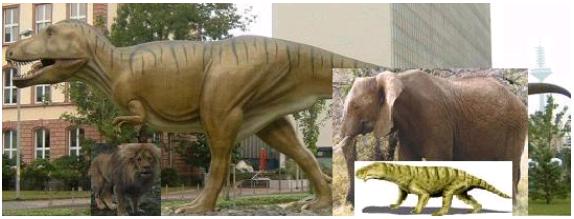
Fig. 2 King of Speed |
I think that you’re getting the hang of it. The objects are: torso, legs, hands, tails, necks, heads, and brains. The categories in
which animals compete are: size, strength, speed, ferocity, diving, flying, jumping, grabbing, reaching, and thinking. Objects
are digital kind of stuff: you either have them or you don’t. Skills or features such as size, length, weight, and speed are
analog type of stuff. Once you have legs, speed is an issue of degrees. A mouse darts orders of magnitude faster than a slug
and a cheetah leaves a mouse biting the dust. Likewise, a mouse is orders of magnitude larger than an ant, yet it is dwarfed
by an elephant which in turn is outclassed by T-Rex.
So where does intelligence fit in? How are we going to decide which is the smartest species in the world if we don't even
have a definition of the word intelligence? The best that the experts can do is objectively compare brain size or brain to
body size. The king of brain of all times appears to be the whales. They have the largest brains in the animal kingdom, but
this doesn't help them understand Math. The king of brain-to-body ratio was probably Neanderthal. He had both a bigger
brain and a larger brain to body ratio than modern Man. Perhaps he would have understood Math eventually had he still
been around. But today it's our species which holds the record in brain-to-body (Fig. 3). Dolphins, parrots, and poodles
are farther behind in this category and seashells and termites are farther still. So what have we learned about intelligence?
Fig. 3 King of IQ? |
5.0 There can only be one champion of intelligence
On the other hand, Mother Nature can only allow one champion per function. There can only be one largest animal of them
all. And there can only be one fastest of them all. And if we define 'intelligence' as simply the brain to body ratio, there can
only be one smartest of them all, both within a given epoch and throughout the entire history of Earth. If each species
strives to be the best at what it does and eventually manages to perfect its trade, competition leads to a champion in each
category. In the case of the hominids, Mother Nature apparently had pity on her least physically endowed children. The
hominids weren't the fastest or the strongest or the biggest. They were no match in the open field against a cat. They
couldn't flap their stringy arms in the air or under the sea. So dear Mother Nature blessed them with smarts. In retrospect,
it was predictable that a messiah would one day come to rule the Earth and that this King of 'Intelligence' would descend
from the trees (Fig. 5). If there is human level-intelligence somewhere in the Universe, you can be assured that it isn't made
of silicon or wrapped in green skin. If there is human-level intelligence elsewhere, it looks pretty much like us.
Fig. 4 |
|
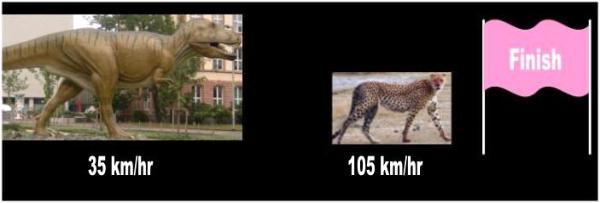
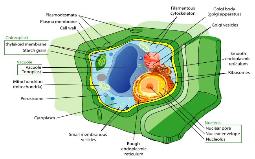
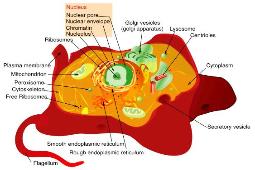
| animal cell |
| plant cell |
| Adapted for the Internet from: Why God Doesn't Exist |

| We can't reason with you any longer, Bill! You've got the brain of a vegetable! We believe it's our moral obligation to put you out of your misery. |
- Module main page: Do UFOs exist?
Pages in this module
1. Life requires tight specifications
2. This page: All living entities developed intelligence
3. Humans were in the cards
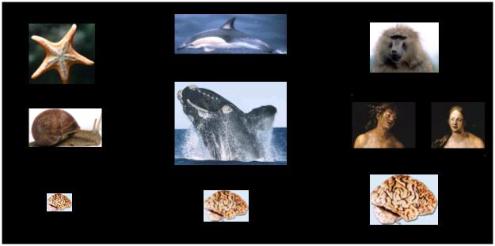
| Even the most primitive cell is a CPU, a control center. |
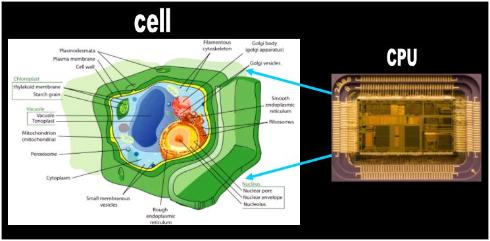
Intelligence descends from the trees |
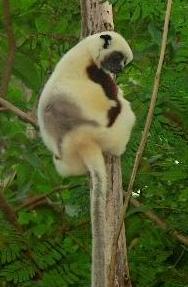
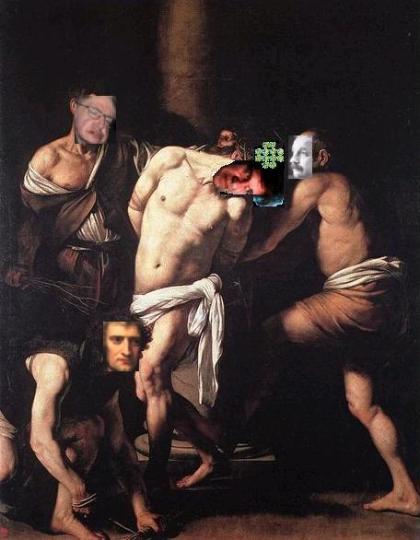
| your brain |
| your brain on drugs |
